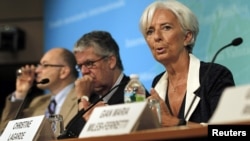The head of the International Monetary Fund, Christine Lagarde, said the "tepid" U.S. economic recovery could be hurt by two problems: Europe's economic troubles and U.S. political gridlock.
Lagarde said the first one is "clearly an exposure to potential contagion from an intensification of the euro area debt crisis."
She said Europe's problems could hurt the American economy by cutting consumer and business confidence, and by reducing demand for U.S. exports. Even without these threats, she said the U.S. economy will probably grow a meager two percent this year and a little faster in 2013.
She said the U.S. Federal Reserve has done a lot to bolster the flagging economy, but could and should do a little more.
IMF experts said Washington should continue to spend on things like job training to boost the economy for the time being, but must cut the deficit in the near future.
The IMF said reducing the deficit will take continued spending cuts as well as tax hikes, but both actions are politically unpopular and have stalled in Congress.
“The second downside risk is obviously a failure to reach an agreement on near-term cuts and spending policies that would trigger what is well-known as the ‘fiscal cliff,’ Lagarde added.
"In addition to that, obviously, the risk of the debt ceiling being reached and not being resolved is also a clear potential for financial market disruption,” she said.
Lagarde spoke to journalists in Washington on Tuesday at the end of a year-long study of the U.S. economy by 12 IMF experts and extensive consultations with government officials.
Lagarde said the first one is "clearly an exposure to potential contagion from an intensification of the euro area debt crisis."
She said Europe's problems could hurt the American economy by cutting consumer and business confidence, and by reducing demand for U.S. exports. Even without these threats, she said the U.S. economy will probably grow a meager two percent this year and a little faster in 2013.
She said the U.S. Federal Reserve has done a lot to bolster the flagging economy, but could and should do a little more.
IMF experts said Washington should continue to spend on things like job training to boost the economy for the time being, but must cut the deficit in the near future.
The IMF said reducing the deficit will take continued spending cuts as well as tax hikes, but both actions are politically unpopular and have stalled in Congress.
“The second downside risk is obviously a failure to reach an agreement on near-term cuts and spending policies that would trigger what is well-known as the ‘fiscal cliff,’ Lagarde added.
"In addition to that, obviously, the risk of the debt ceiling being reached and not being resolved is also a clear potential for financial market disruption,” she said.
Lagarde spoke to journalists in Washington on Tuesday at the end of a year-long study of the U.S. economy by 12 IMF experts and extensive consultations with government officials.





